The Best Order To Read The Bible For New Believers (2024)
What is the best order to read the Bible in 2024?
(Without trying to read from Genesis to Revelation in chronological order. Aka. the chronological Bible reading plan.)
Reading the Bible in order can be difficult. There are 66 books in the Protestant Bible. Sometimes, beginners do not know which book is a great place to start or where to start reading the Bible.
There is no secret and correct order to read the Bible. All you have to do is simply read and persevere. However, I have developed a strategy – with a suggested order – that can help you get the most out of the Bible.
SPOILER ALERT. My strategy is not to provide another Bible reading plan to do within a year. (Even though there is nothing wrong with a reading plan. I personally use the M’Cheyne Bible-Reading Plan.)
This strategy is designed for beginners. Hopefully, you can slowly work your way through the books of the Bible. (You can also try my suggested reading order for the New Testament.)
If you are an audible learner of the Bible, then try Audible for FREE for 30 days! Audible offers Bibles to listen to, such as the ESV, NIV, KJV, and NKJV. Some of them add sound effects and dramatize the Bible reading.
Perhaps the best place to start reading the whole Bible for the first time is to have a better understanding of the story.
But I encourage you to learn new Bible Study skills to dig deeper into God’s word.
Let’s get right into it.
READ THE FUNDAMENTAL BOOKS

All the books of the Bible are fundamental (2 Timothy 3:16-17). It is inspired by the Holy Spirit.
However, reading some of the underlying books is like dipping your feet into the shallowest area of the pool.
It is (probably) the least intimidating approach.
Narratives describe the biblical history of the nation of Israel. They are a type of book in the Bible that is easier to read. Reading the Gospels will unfold the life and teachings of Jesus.
They generally cover the majority of the key storylines of the Bible.
Afterwards, you read several books from the Old and New Testament together. What should be the fundamental books of the Bible to read in order for beginners?
- The gospel of John. This is a great starting point for new believers or seekers.
- The book of Genesis. The beginning of the Bible.
- The book of Exodus. The intense action between Moses, the prophet, and Pharaoh.
- The gospel of Mark. The simplest gospel where Jesus is on the move.
- The book of Ephesians. The shorter version of the book of Romans.
- The book of Colossians. The shorter version of the book of Ephesians.
- The book of Joshua. Israel’s conquest of the Promised Land.
- The book of Ruth. A “Romeo and Juliet” type of story.
- The book of Luke. The longest gospel about the life of Jesus.
- The book of Acts. Follow the Adventure of the Apostles!
- The book of 1 Samuel. It’s not about Samuel. It is about King Saul (and David).
- The book of 2 Samuel. The rise and fall of King David.
- The book of 1 Kings. The corruption of the kingdom of Israel.
- The book of 2 Kings. The invasion of the Assyrians and Babylonians.
- The book of Jonah. The famous fish story.
- The book of Matthew. The first book of the New Testament that opens with a genealogy. Fun!
- The book of Ezra. The Israelites return to Israel to rebuild the temple.
- The book of Haggai. God threatened the Israelites for not rebuilding the temple.
- The book of Nehemiah. The leadership of Nehemiah and the rebuilding of the walls of Jerusalem.
- The book of Malachi. It is the final book in the Old Testament. Find out what happened to the Israelites.
- The book of 1 John. How do you know if you’re truly a Christian? Read this letter.
- The book of Revelation. The final boss in the Bible.
Why 22 books?
Reading this list would cover more than 1/3 of the Bible. After reading the fundamental books, you should be able to grasp the essential storyline and big picture of the Bible.
But it doesn’t stop there.
Related Article: How Long Does It Take To Read The Bible?
READ THE DEEPER BOOKS
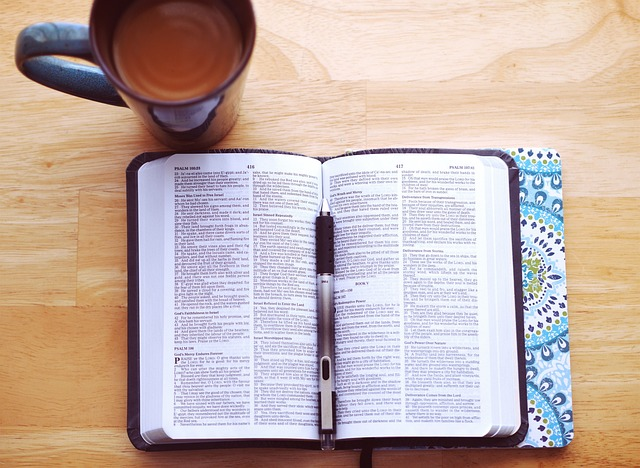
These books will help you go deeper in your understanding of the Bible. This list covers the background of the narrative and the theology of the Bible in chronological order. Some of them have difficult passages.
They are great for daily Bible Study. And it is worth deepening your relationship with God.
Let’s dive right into it!
- The book of Romans. The comprehensive exposition of the good news of Jesus Christ
- The book of Deuteronomy. Moses’ final instruction before Israel goes into the land of Canaan.
- The book of 1 Corinthians. This reveals God’s grace towards a church that has done wild.
- The book of Judges. The extremely dark side of the history of Israel in the Promised Land.
- The book of 2 Corinthians. The Apostle Paul defends himself against accusations.
- The book of Daniel. Half of this book contains famous children’s Sunday school stories.
- The book of Psalms. The longest book of the Bible.
- The book of Galatians. The Apostle Paul uses indicting words to confront a false gospel.
- The book of Philippians. Got joy?
- The book of Proverbs. The wise sayings found in the Old Testament.
- The book of James. The wise sayings for the Christian life in the New Testament.
- The book of 1 Thessalonians. You get the basic knowledge of eschatology (end times).
- The book of 2 Thessalonians. Who is the man of lawlessness?
- The book of Isaiah. Prophecies the judgment of Israel. Offers hope of restoration in the future.
- The book of Jeremiah. Jeremiah is a prophet. He weeps over the sin of Israel.
- The book of 1 Timothy. Paul is instructing Timothy to establish order in the church.
- The book of 2 Timothy. Paul is encouraging Timothy to remain faithful in the midst of opposition.
- The book of Titus. Paul’s instruction to Titus is almost similar to 1 Timothy.
- The book of Philemon. This is about a slaveowner and a slave. Controversial!
- The book of 1 Peter. Are you suffering as a Christian? Read this letter!
- The book of 2 Peter. Peter exhorts the persecuted Christians to grow in the knowledge of God.
- The book of Jude. Believers are to contend for their Christian faith against false teachers.
CONGRATULATIONS.
You are ⅔ of the way done with completing your Bible reading. You should know the storyline and theology of the Bible. It is time complete the rest of the Bible!
(But don’t assume the remainder are leftovers. They’re all connected to the story of the Bible.)
Please persevere!
READ THE SUPPLEMENTARY BOOKS

These books supplement the missing pieces of your Bible knowledge. They are not unimportant for they are the word of God. They provide you with a well-rounded storyline of the Bible. Consider them as “behind the scenes” in the main story.
Sadly, they are not read by many. But you are different! Let’s do this.
- The book of Job. Are you going through pain and suffering? Job can sympathize with you.
- The book of Leviticus. The killer of any Bible reading plan. It’s all about the law.
- The book of Numbers. Israel travels to the Promised Land. But they’re SO rebellious!
- The book of Hebrews. Jesus is greater and better.
- The book of Ecclesiastes. A book that is filled with cynical wisdom for the real world.
- The book of Song of Solomon. Jewish boys were not allowed to read it. It’s hot and spicy.
- The book of 1 Chronicles. Difficult start. But, repeats some of the narratives from 1 and 2 Samuel.
- The book of 2 Chronicles. Focusing on the kingdom of Judah.
- The book of Esther. The only book in the Bible that doesn’t mention God.
- The book of Lamentations. Jeremiah was crying over the destruction of Judah. That’s So Sad!
- The book of Ezekiel. Prophecy against Judah for its sin. But this book has a cool name!
- The book of Hosea. Israel broke her covenant with God. But God remains merciful.
- The book of Joel. Do you like locusts? You might enjoy this book.
- The book of Amos. Israel was hypocritical in its worship. God hates that.
- The book of Obadiah. The prophecy against the nation of Edom.
- The book of Micah. God must confront and judge evil. But God’s covenant love and promise are more powerful than evil.
- The book of Nahum. The prophecy against Nineveh. (This might have happened after Jonah.)
- The book of Habakkuk. Why does God allow evil to exist? Check out this book.
- The book of Zephaniah. Most of it describes images of God’s justice. But also God’s love in the end.
- The book of Zechariah. This will generally help you understand the book of Revelation.
- The book of 2 John. A short book about not welcoming false teachers.
- The book of 3 John. A tiny book about showing hospitality to missionaries.
PICK UP A STUDY BIBLE

Study Bible provides a brief commentary of the verses. A reader may sometimes want to understand the meaning of the passage.
(Who doesn’t ask questions about what they are reading?)
It also explains the introductory background: authorship, date, and key themes.
I recommend purchasing a study Bible to use as you are reading.
No money? Try asking your church to sponsor you.
No luck? David Guzik provides a free Bible commentary online!
If you are able to afford a study Bible, I recommend the following study Bibles:
The MacArthur Study Bible
This Study Bible provides exhaustive study notes of Dr. John MacArthur. He’s been a faithful expositor and pastor at Grace Community Church for over 50 years.
John MacArthur has influenced me and taught me about being faithful to God’s word. So, I also recommend this study Bible.
Believer’s Bible Commentary
Make Bible study a part of your daily life with the thorough yet easy-to-read commentary that turns complicated theology into practical understanding.
This is one of the best Bible commentaries on the whole Bible. It helped me understand, for example, the book of Proverbs at a deeper level.
For further reading, check out this article: The Best Study Bible For Beginners In 2024 (Top 7 Options)
CHOOSE THE RIGHT BIBLE TRANSLATION FOR BEGINNERS

The English Bible has dozens of translations.
It can be hard for new Christians to find a whole Bible that is the right fit for them. Realistically, there is no such thing as the best Bibles in the world. But you should find the most accurate Bible translations.
The most popular English translation of the Bible is the New International Version (NIV). Personally, I prefer the English Standard Version (ESV) because the translation is closer to the original language.
The best option I would suggest for beginners is the ESV. If English is not your first language, use the New Living Translation (NLT). The best Bible for new believers, in my opinion, would be the ESV.
There are Bible translations that you should avoid, such as the Message and the New World Translation.
Check out the Best Premium Bibles if you are in the market for high-quality Bibles.
GET AN OVERVIEW OF EACH BOOK
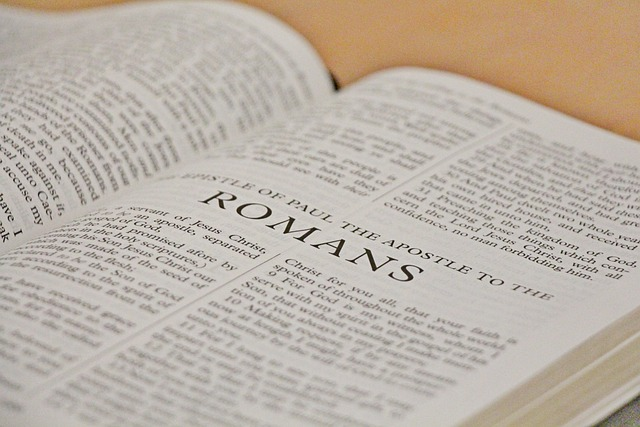
Understanding the overview of the books will help you know the storyline of the book.
An overview can provide an outline.
For example, in one of Paul’s letters, here is the framework for the book of Romans:
- Romans 1-3a – The Necessity Of The Gospel
- Romans 3b-4 – The Heart Of The Gospel
- Romans 5-8 – The Implication Of The Gospel
- Romans 9-11 – The Advancement Of The Gospel
- Romans 12-16 – The Application Of The Gospel
The Bible Project provides a helpful illustration of the overview of all the books of the Bible in chronological order.

Gordon Fee and Douglas Stuart have written a beginner’s guide to each book of the Bible.
Related Article: Best Books On How To Read The Bible For Beginners
Frequently Asked Questions
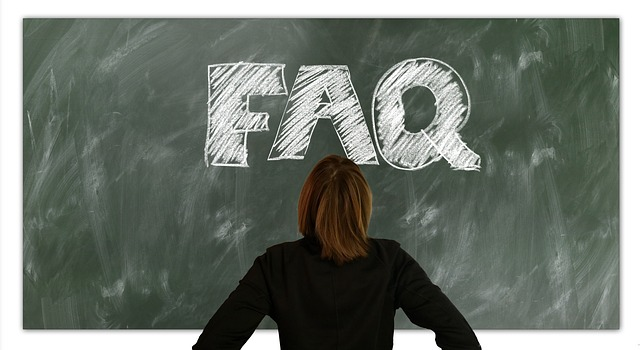
WHAT IS THE BEST ORDER TO READ THE GOSPELS?
The New Testament begins with the four gospels: Matthew, Mark, Luke, and John. All of them describe the life and ministry of Jesus Christ.
Matthew describes Jesus as the Messiah to his Jewish audience. It contains 28 chapters. It does contain the birth of Jesus and the nativity scene.
Mark describes Jesus as the Servant to a mixed audience of Jews and Gentiles. It is the shortest gospel, but it is easier to read.
Luke describes Jesus as Man to a man named Theophilus, who was a Gentile. While it has 24 chapters, it is the longest gospel in terms of its written content. Luke describes in detail the birth of Jesus and John the Baptist.
John describes Jesus as God. It contains many of the memorable verses, such as John 3:16 and John 14:6. Many believers would encourage non-believers and new believers to read this gospel to get to know Jesus.
Therefore, the best order to read the gospels would be John, Mark, Matthew, and Luke.
After reading through Luke, you can proceed to read the book of Acts as Luke is also the author of it.
WHAT IS THE BEST BOOK OF THE BIBLE TO START WITH FOR NEW BELIEVERS?
The best book of the Bible to start with for new believers is the Gospel of John.
WHAT IS THE BEST WAY TO READ THE BIBLE?
- Pray: Ask the Lord for humility. Ask the Lord to illuminate His word to you.
- Pick a book of the Bible
- Read through chapter 1.
- Read through the whole book in chronological order.
- Read the Bible in context.
- Meditate on a verse or two for personal reflection and application.
- Praise: Thank the LORD for His word. Ask Him to help you be a doer of His word, not just a hearer.
WHAT ARE THE DIFFERENT LITERARY STYLES IN THE BIBLE?
You may have noticed that the Bible is not written in the same style.
There are at least nine literary styles that you should pay attention to when you are reading and studying the Bible.
- The Law: God gave the Israelites the laws in the Old Testament books, such as Exodus, Leviticus, Numbers, and Deuteronomy. Understanding the law should help you comprehend the behaviours of God’s people in the historical narratives.
- The Narrative: Almost 50% of the Bible is narrative. The book of Acts, for example, talks about the birth of the Christian church by following the story of Jesus’ apostles.
- Poetry: The book of Psalms emphasizes poetry. Readers should consider knowing the poetic devices, such as chiasm, inclusio, etc.
- Wisdom Literature: The book of Proverbs, Ecclesiastes, Job, and James teaches Christians the practical skills of living this earthly life in light of the fear of the Lord.
- Prophecy: the major prophets and the minor prophets teach us about God’s prophets. God used them to warn the rebellious people of Israel (lest they suffer future consequences) while also bringing hope to the remnant of Israel.
- The Gospels: the four gospels record the life, death, and resurrected Christ.
- Parables: Jesus Christ told stories (also known as parables) to illustrate spiritual matters, such as the kingdom of God and the gospel. The famous passages on parables are the parable of the lost son and seed.
- The Letters: The Apostles Paul, Peter, John, and others have written letters to many Christians living in the 1st century. Their letters are doctrinal and practical for the Christian life. Personally, the letters to the Romans and Philippians had a life-changing effect on my Christian life.
- The Apocalyptic Literature: Finally, the books of Revelation and Daniel speak about the future events of the world.
Different literary styles will affect your interpretation of the text. Most of the time, more than one literary style is embedded into a single book of the Bible.
For example, many Bible narratives would have poetry, such as 1 Samuel 2 and 1 Chronicles 16.
WHAT ARE YOUR THOUGHTS?
The best order to read the Bible for beginners is to start knowing the storyline of the Bible. You can choose to mix and match the method. Strategize your Bible reading.
Honestly, there isn’t a perfect Bible reading plan. (That’s why there are many different ones). Perhaps this method might work for you or it might not! But that’s okay.
Slowly develop a healthy discipline and routine in reading God’s Word regularly. That’s my hope and prayer for you.
With that, it is time to hear from you.
Are you going to implement this plan? Let me know if it works for you! What are the difficult things to read in the Bible?

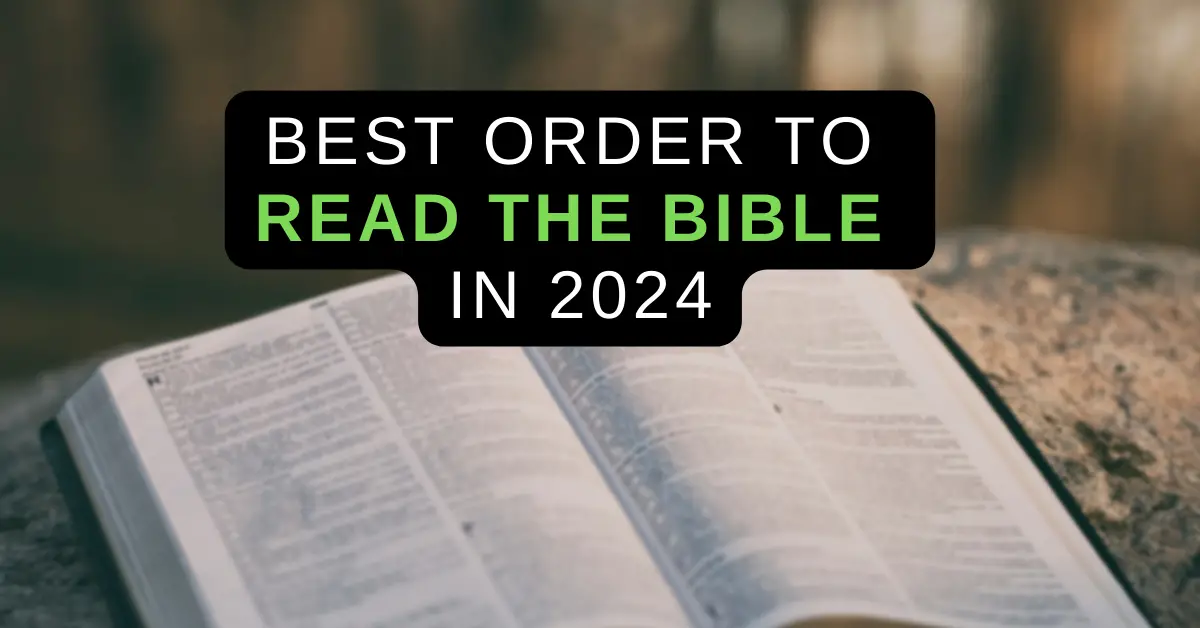





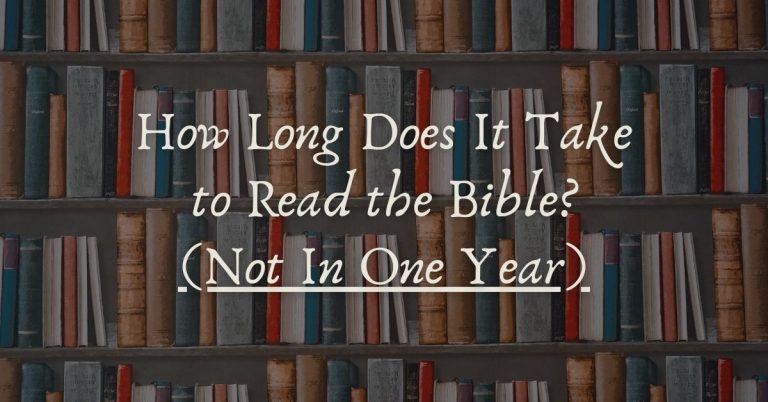

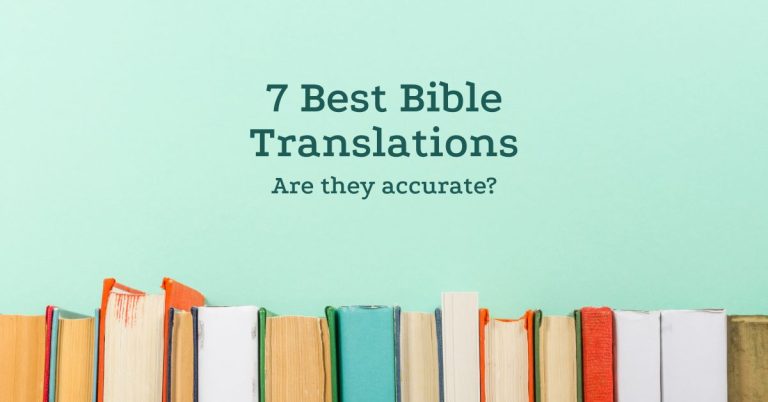
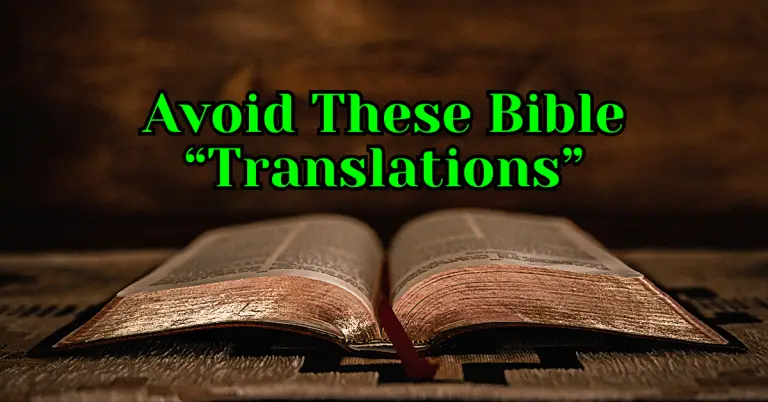

2 Comments